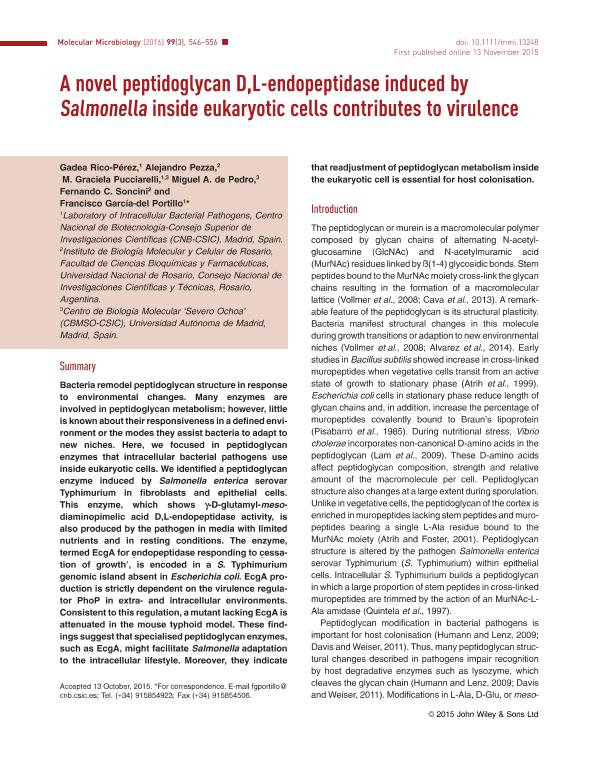Artículo
A novel peptidoglycan D,L-endopeptidase induced by Salmonella inside eukaryotic cells contributes to virulence
Rico-Pérez, Gadea; Pezza, Alejandro; Pucciarelli, M. Graciela; de Pedro, Miguel A.; Soncini, Fernando Carlos ; García del Portillo, Francisco
; García del Portillo, Francisco
 ; García del Portillo, Francisco
; García del Portillo, Francisco
Fecha de publicación:
02/2016
Editorial:
Wiley Blackwell Publishing, Inc
Revista:
Molecular Microbiology
ISSN:
0950-382X
Idioma:
Inglés
Tipo de recurso:
Artículo publicado
Clasificación temática:
Resumen
Bacteria remodel peptidoglycan structure in response to environmental changes. Many enzymes are involved in peptidoglycan metabolism; however, little is known about their responsiveness in a defined environment or the modes they assist bacteria to adapt to new niches. Here, we focused in peptidoglycan enzymes that intracellular bacterial pathogens use inside eukaryotic cells. We identified a peptidoglycan enzyme induced by Salmonella enterica serovar Typhimurium in fibroblasts and epithelial cells. This enzyme, which shows γ-D-glutamyl-meso-diaminopimelic acid D,L-endopeptidase activity, is also produced by the pathogen in media with limited nutrients and in resting conditions. The enzyme, termed EcgA for endopeptidase responding to cessation of growth', is encoded in a S. Typhimurium genomic island absent in Escherichia coli. EcgA production is strictly dependent on the virulence regulator PhoP in extra- and intracellular environments. Consistent to this regulation, a mutant lacking EcgA is attenuated in the mouse typhoid model. These findings suggest that specialised peptidoglycan enzymes, such as EcgA, might facilitate Salmonella adaptation to the intracellular lifestyle. Moreover, they indicate that readjustment of peptidoglycan metabolism inside the eukaryotic cell is essential for host colonisation. Many enzymes direct peptidoglycan metabolism but little it is known about their regulation.
Palabras clave:
Salmonella
,
Host Colonisation
,
Peptidoglycan Metabolism
,
Phop-Regulated
Archivos asociados
Licencia
Identificadores
Colecciones
Articulos(IBR)
Articulos de INST.DE BIOLOGIA MOLECULAR Y CELULAR DE ROSARIO
Articulos de INST.DE BIOLOGIA MOLECULAR Y CELULAR DE ROSARIO
Citación
Rico-Pérez, Gadea; Pezza, Alejandro; Pucciarelli, M. Graciela; de Pedro, Miguel A.; Soncini, Fernando Carlos; et al.; A novel peptidoglycan D,L-endopeptidase induced by Salmonella inside eukaryotic cells contributes to virulence; Wiley Blackwell Publishing, Inc; Molecular Microbiology; 99; 3; 2-2016; 546-556
Compartir
Altmétricas



